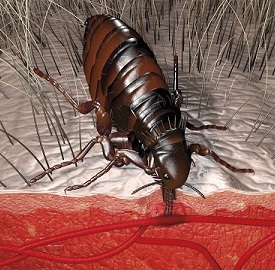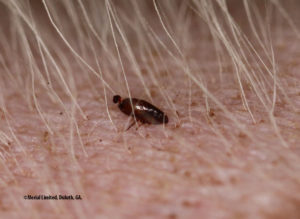
Fleas are by far the most common parasite we see on dogs and cats. You may see them on your pet’s skin – they are tiny black/brown insects, which can move very quickly! They are actually easier to see after you have treated your pet, as they will be sluggish from the effects of the treatment. You will normally only see adult fleas on your pet if there is an infestation in the home, as the adults are unfortunately just the tip of the iceberg. In long-haired pets they can be difficult to see at all. As a further check, you can comb your pet’s fur onto a piece of wet white paper. Flea poos are little black dots, which turn red when they contact the wet paper.
Fleas have a 4 stage life-cycle: eggs, larvae, pupae and adult fleas. Only adult fleas live on the pet – the rest live in your home, car and garden environment. Female fleas can produce over 2000 eggs in their life-time! The whole life-cycle can take a few weeks through to 6 months; the pupae are very resilient and can lie dormant until the right conditions for hatching. With central heating commonplace, fleas can survive all year round in the UK.
Adult fleas suck the blood of the pet, which can cause anaemia especially in young animals. Flea bites can cause anything from mild irritation through to a severe allergy in your pet. This usually presents as itching and hair-loss on the rump and tail base in dogs and over-grooming, hair-loss and/or scabs on the skin in cats. Fleas can also transmit disease, for example a type of tapeworm (Dipylidium caninum). Fleas can bite humans too, usually on the ankles, causing an itchy rash.
Treatment for a flea infestation can be an expensive, time-consuming and frustrating process. Even with effective treatment an infestation can take months to clear as the pupae are very resistant – it is best to seek advice from your vet to source the most effective and safe treatments for your pets and house. We can also advise about how best to clear the fleas from your home – speak to a member of our team, or ask for our information sheet.
Effective prevention is much simpler than curing an infestation. For effective flea prevention you should treat all your dogs and cats all year round, even if they don’t mix with other animals or go outdoors. Any breaks/lapse in treatment will mean your pet is at risk of picking up fleas again. Once on your pet they will start rapidly breeding and laying eggs which will infest your home. Prescription products bought from the vets help to prevent an infestation by effectively and quickly killing adult fleas. They also prevent any eggs that are laid from hatching out and/or kill the flea before they have a chance to lay any eggs. Different products are available to suit your pet and their lifestyle e.g. tasty chews for dogs, spot-on preparations and long-lasting collars. Flea prevention treatments are included in our Complete Care Club, allowing you to spread the cost of effective parasite prevention.

